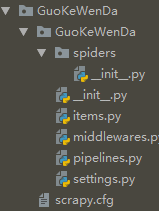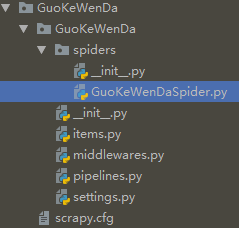Python專案--Scrapy框架(二)
阿新 • • 發佈:2018-12-15
本文主要是利用scrapy框架爬取果殼問答中熱門問答, 精彩問答的相關資訊
環境
win8, python3.7, pycharm
正文
1. 建立scrapy專案檔案
在cmd命令列中任意目錄下執行以下程式碼, 即可在該目錄下建立GuoKeWenDa專案檔案
scrapy startproject GuoKeWenDa

2. 建立爬蟲主程式
在cmd中切換到GuoKeWenDa目錄下, 執行以下程式碼:
cd GuoKeWenDa
scrapy genspider GuoKeWenDaSpider GuoKeWenDaSpider.toscrape.com
建立GuoKeWenDaSpider.py檔案成功

3. 定義要爬取的專案
分析果殼熱門問答和果殼精彩問答, 發現兩頁面的結構一致, 我們爬取其中的主題, 簡介, 關注數, 回答數, 標籤, 文章連結等6個資訊
在items.py中定義
1 import scrapy 2 from scrapy.item import Item, Field 3 4 class GuokewendaItem(Item): 5 # define the fields for your item here like: 6 # name = scrapy.Field() 7 title = Field() 8 intro = Field()9 attention = Field() 10 answer = Field() 11 label = Field() 12 link = Field()
4. 編寫爬蟲主程式
在GuoKeWenDaSpider.py檔案中編寫:
1 import scrapy 2 from scrapy.spiders import CrawlSpider 3 from scrapy.selector import Selector 4 from scrapy.http import Request 5 from GuoKeWenDa.items importGuokewendaItem 6 7 class GuoKeWenDa(CrawlSpider): 8 name = 'GuoKeWenDa' 9 allowed_domains = ['GuoKeWenDaSpider.toscrape.com'] 10 urls = ['hottest', 'highlight'] 11 #對urls進行遍歷 12 start_urls = ['https://www.guokr.com/ask/{0}/?page={1}'.format(str(m),str(n)) for m in urls for n in range(1, 101)] 13 def parse(self, response): 14 item = GuokewendaItem() 15 #初始化原始碼 16 selector = Selector(response) 17 #用xpath進行解析 18 infos = selector.xpath('//ul[@class="ask-list-cp"]/li') 19 for info in infos: 20 title = info.xpath('div[2]/h2/a/text()').extract()[0].strip() 21 intro = info.xpath('div[2]/p/text()').extract()[0].strip() 22 attention = info.xpath('div[1]/p[1]/span/text()').extract()[0] 23 answer = info.xpath('div[1]/p[2]/span/text()').extract()[0] 24 labels = info.xpath('div[2]/div/p/a/text()').extract() 25 link = info.xpath('div[2]/h2/a/@href').extract()[0] 26 if labels: 27 label = " ".join(labels) #用join將列表轉成以" "分隔的字串 28 else: 29 label ='' 30 item['title'] = title 31 item['intro'] = intro 32 item['attention'] = attention 33 item['answer'] = answer 34 item['label'] = label 35 item['link'] = link 36 yield item
5. 儲存到MongoDB
import pymongo class GuokewendaPipeline(object): def __init__(self): '''連線MongoDB''' client = pymongo.MongoClient(host='localhost') db = client['test'] guokewenda = db['guokewenda'] self.post= guokewenda def process_item(self, item, spider): '''寫入MongoDB''' info = dict(item) self.post.insert(info) return item
6. 配置setting
在原有程式碼中去掉以下程式碼的註釋 (快捷鍵"Ctrl" + "/")
USER_AGENT = 'Mozilla/5.0 (Windows NT 6.3; Win64; x64) AppleWebKit/537.36 (KHTML, like Gecko) Chrome/68.0.3440.106 Safari/537.36' DOWNLOAD_DELAY = 5 DEFAULT_REQUEST_HEADERS = { 'Accept': 'text/html,application/xhtml+xml,application/xml;q=0.9,*/*;q=0.8', 'Accept-Language': 'en', } ITEM_PIPELINES = { 'GuoKeWenDa.pipelines.GuokewendaPipeline': 300, }
7. 新建main.py檔案
在GuoKeWenDa檔案目錄下新建main.py檔案, 編輯:
1 from scrapy import cmdline 2 cmdline.execute('scrapy crawl GuoKeWenDa'.split())
執行main.py檔案
8. 爬取結果

總結
實際中熱門問答只有2頁, 因此遍歷它的第3到100頁就顯得太多餘:
urls = ['hottest', 'highlight'] start_urls = ['https://www.guokr.com/ask/{0}/?page={1}'.format(str(m),str(n)) for m in urls for n in range(1, 101)]
start_urls = ['https://www.guokr.com/ask/hottest/?page={}'.format(str(m)) for m in range(1,3)] + ['https://www.guokr.com/ask/highlight/?page={}'.format(n) for n in range(1,101)]
